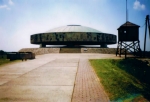Paralysis and release



By animan
- 5867 reads
It was as when they said he's ill
and I walked to him wondering,
racing in a limbo - what
to expect, how react
But, when I saw his new silent paralysis,
stoked and struck,
I held the frightened hand that had moulded me
and waited, in his forced silence, who had listened despite,
and, afterwards, grief came a prickly pelt.
It was as when the phallus aware of its mere velleity
bends and drifts, and, then,
sucked would pound as a caged seal into a new pool,
and sees the deep violet there - it knows,
receding, as the mind laughs blind.
It was as, at Majdanek, I walk
thoughtless
down the middle aisle to the mound of ash
and the ground beyond scabrous with guilty lumps,
and the stacked beds like racks where the stench no wind will dissipate,
of plank and tray and wire and stove and tap and scratched slab;
as the haze fades behind the watch towers,
I walk past the shoes and showers and, nerved to it, to where
Death concentrated in a room - the penseur.
The rough grass tended, the oven house locked,
I leave it like the dead mad, glowing upwards and backwards,
nod to platitudes
intellect at ironies,
accept no sensibility that can refine and rest it.
It was as when the thought caught in the synapse
sought for a shape and a link and, then,
the character was richer than the conception,
the symbol tenser than the image.
It was as when, at the Sagrada, when
the builder's sleep raw with voices shaped
bold sculptures to melt away like lava,
and children dropped from fairground towers. Mazes
rise into space and steps step
down into air, where, realised, the tourist later peers
into the builder's dreams.
It was as when your love marries away,
and the bridegroom is complimented and
his laugh rings off the chessboard floors
and is absorbed in the thought of statues
half-lodged in walls. The desire has no
object now and the turning on itself
is a kid of limp malice and peace, and all dreaming is in
black and white.
It was as when they said he's ill
and I walked to him wondering, it was as when
I would hold the will to hold the frightened hand.
- Log in to post comments
Comments
This is packed with such
This is packed with such depths that I've been back for several helpings. Reminded me in many ways of a pantoum. Dipping into past memories and places, all those painful emotions, in that dreamy style. It charms you along with heart jerks along the way. The time lapse from 'after death' back to 'before death' is very effective - drags you back to a sense of dread with such sharpness. A painful and enchanting piece.
- Log in to post comments
I missed this before and
I missed this before and happened to stumble on it whilst viewing the list of 'cherry picked'. Your poem is stunning. There is so much to this that it takes several reads to fully appreciate, as Vera said, it's depths. One I will want to read and think about again.
- Log in to post comments
This is so good.
This is so good.
The immediacy of the foreboding and the dread of the encounter between the visitor (grown up child?) and the patient (parent/holocaust survivor possibly?) is effortlessly achieved. The horribly familiar 'it won't be as bad as I think' situation and then the reality.... The second stanza is superb, but its second half is as good a five lines of poetry that you will ever read anywhere; period.
The recollection of the visit to Majdanek speaks in a voice of terror and events there are foretold at the beginning of the second stanza "stoked and struck". The thought that it better left without qualification or an attempt at rationalising the 'impossibly irrational' was so well considered. The stanza all the more powerful and admirable for it.
To have chosen Gaudi's Sagrada as the next backdrop to the turmoil on show is masterful. That the concentration camp is unfathomable and emotionally unquantifiable in its own terrible way, the Sagrada Familia is the same but for very different reasons. The surrealism of the architecture as unfathomable as the fear of the patient, as beautiful and as mad as life itself but still somehow disquieting "children dropped from fairground towers".
The pain and loneliness of a lover at his/her own lovers wedding and being an onlooker and not part of the main act cranks the impending loss and isolation to levels that really are almost too much to bear. Bravo. To have to overcome that fear and pain and sense of loss despite everything - because it is the right thing to do - is heartbreaking.
This is a heartbreaking, wonderful piece of work.
- Log in to post comments
Wow. This one took me a few
Wow. This one took me a few go throughs and I found different stuff I like about it every time!
-Matt M
- Log in to post comments
Brilliant poem. Heartbreaking
Brilliant poem. Heartbreaking and very moving imagery.
- Log in to post comments
This is a work of brilliance.
This is a work of brilliance. It's painful, beautiful and dreamlike. Really, congrats.
- Log in to post comments


